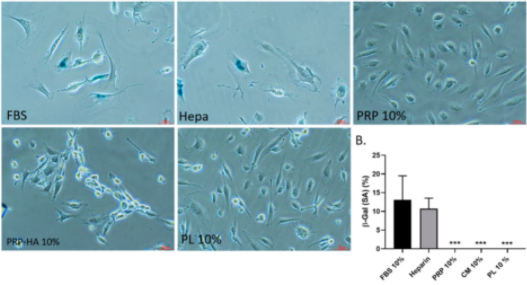PRP alone or combined with HA are growth factors reservoirs that promote angiogenesis in in-vitro cell tissue-engineering applications In this in vitro study, the authors evaluated and compared the ability of three platelet-derived preparations: platelet-rich-plasma (PRP, prepared with CuteCell® medical device), PRP-hyaluronic acid (PRP-HA, Cellular Matrix®) and platelet lysates (PL) at various concentrations (5 – 40%)… Continue reading Study: Basic research
PRP alone or combined with HA are growth factors reservoirs that promote angiogenesis in in-vitro cell tissue-engineering applications
In this in vitro study, the authors evaluated and compared the ability of three platelet-derived preparations: platelet-rich-plasma (PRP, prepared with CuteCell® medical device), PRP-hyaluronic acid (PRP-HA, Cellular Matrix®) and platelet lysates (PL) at various concentrations (5 – 40%) to modulate metabolism, viability, senescence, secretion of angiogenic factors and the angiogenic capacity of human umbilical vein endothelial cells.
PRP and PRP-HA stimulated all steps of the angiogenic process resulting in massive sprouting of a branched microvessel network, while PL showed a weaker angiogenic response.
PRP and PRP-HA, which contain living platelets and release growth factors in an orchestrated manner, induced the best angiogenic response in this model, which mimics the whole angiogenic process. HA, as a natural hydrogel, would promote a controlled release of PRP growth factors.

Bruno BOEZENNEC, MD, Managing Editor
